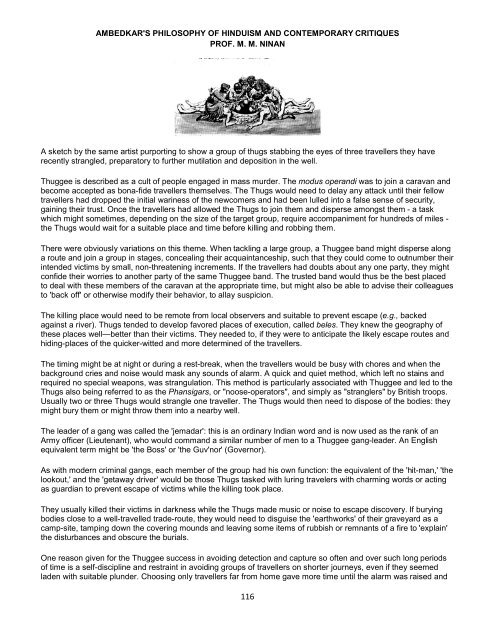Ambedkar-Philosophy of Hinduism
You also want an ePaper? Increase the reach of your titles
YUMPU automatically turns print PDFs into web optimized ePapers that Google loves.
AMBEDKAR'S PHILOSOPHY OF HINDUISM AND CONTEMPORARY CRITIQUES<br />
PROF. M. M. NINAN<br />
A sketch by the same artist purporting to show a group <strong>of</strong> thugs stabbing the eyes <strong>of</strong> three travellers they have<br />
recently strangled, preparatory to further mutilation and deposition in the well.<br />
Thuggee is described as a cult <strong>of</strong> people engaged in mass murder. The modus operandi was to join a caravan and<br />
become accepted as bona-fide travellers themselves. The Thugs would need to delay any attack until their fellow<br />
travellers had dropped the initial wariness <strong>of</strong> the newcomers and had been lulled into a false sense <strong>of</strong> security,<br />
gaining their trust. Once the travellers had allowed the Thugs to join them and disperse amongst them - a task<br />
which might sometimes, depending on the size <strong>of</strong> the target group, require accompaniment for hundreds <strong>of</strong> miles -<br />
the Thugs would wait for a suitable place and time before killing and robbing them.<br />
There were obviously variations on this theme. When tackling a large group, a Thuggee band might disperse along<br />
a route and join a group in stages, concealing their acquaintanceship, such that they could come to outnumber their<br />
intended victims by small, non-threatening increments. If the travellers had doubts about any one party, they might<br />
confide their worries to another party <strong>of</strong> the same Thuggee band. The trusted band would thus be the best placed<br />
to deal with these members <strong>of</strong> the caravan at the appropriate time, but might also be able to advise their colleagues<br />
to 'back <strong>of</strong>f' or otherwise modify their behavior, to allay suspicion.<br />
The killing place would need to be remote from local observers and suitable to prevent escape (e.g., backed<br />
against a river). Thugs tended to develop favored places <strong>of</strong> execution, called beles. They knew the geography <strong>of</strong><br />
these places well—better than their victims. They needed to, if they were to anticipate the likely escape routes and<br />
hiding-places <strong>of</strong> the quicker-witted and more determined <strong>of</strong> the travellers.<br />
The timing might be at night or during a rest-break, when the travellers would be busy with chores and when the<br />
background cries and noise would mask any sounds <strong>of</strong> alarm. A quick and quiet method, which left no stains and<br />
required no special weapons, was strangulation. This method is particularly associated with Thuggee and led to the<br />
Thugs also being referred to as the Phansigars, or "noose-operators", and simply as "stranglers" by British troops.<br />
Usually two or three Thugs would strangle one traveller. The Thugs would then need to dispose <strong>of</strong> the bodies: they<br />
might bury them or might throw them into a nearby well.<br />
The leader <strong>of</strong> a gang was called the 'jemadar': this is an ordinary Indian word and is now used as the rank <strong>of</strong> an<br />
Army <strong>of</strong>ficer (Lieutenant), who would command a similar number <strong>of</strong> men to a Thuggee gang-leader. An English<br />
equivalent term might be 'the Boss' or 'the Guv'nor' (Governor).<br />
As with modern criminal gangs, each member <strong>of</strong> the group had his own function: the equivalent <strong>of</strong> the 'hit-man,' 'the<br />
lookout,' and the 'getaway driver' would be those Thugs tasked with luring travelers with charming words or acting<br />
as guardian to prevent escape <strong>of</strong> victims while the killing took place.<br />
They usually killed their victims in darkness while the Thugs made music or noise to escape discovery. If burying<br />
bodies close to a well-travelled trade-route, they would need to disguise the 'earthworks' <strong>of</strong> their graveyard as a<br />
camp-site, tamping down the covering mounds and leaving some items <strong>of</strong> rubbish or remnants <strong>of</strong> a fire to 'explain'<br />
the disturbances and obscure the burials.<br />
One reason given for the Thuggee success in avoiding detection and capture so <strong>of</strong>ten and over such long periods<br />
<strong>of</strong> time is a self-discipline and restraint in avoiding groups <strong>of</strong> travellers on shorter journeys, even if they seemed<br />
laden with suitable plunder. Choosing only travellers far from home gave more time until the alarm was raised and<br />
116


















